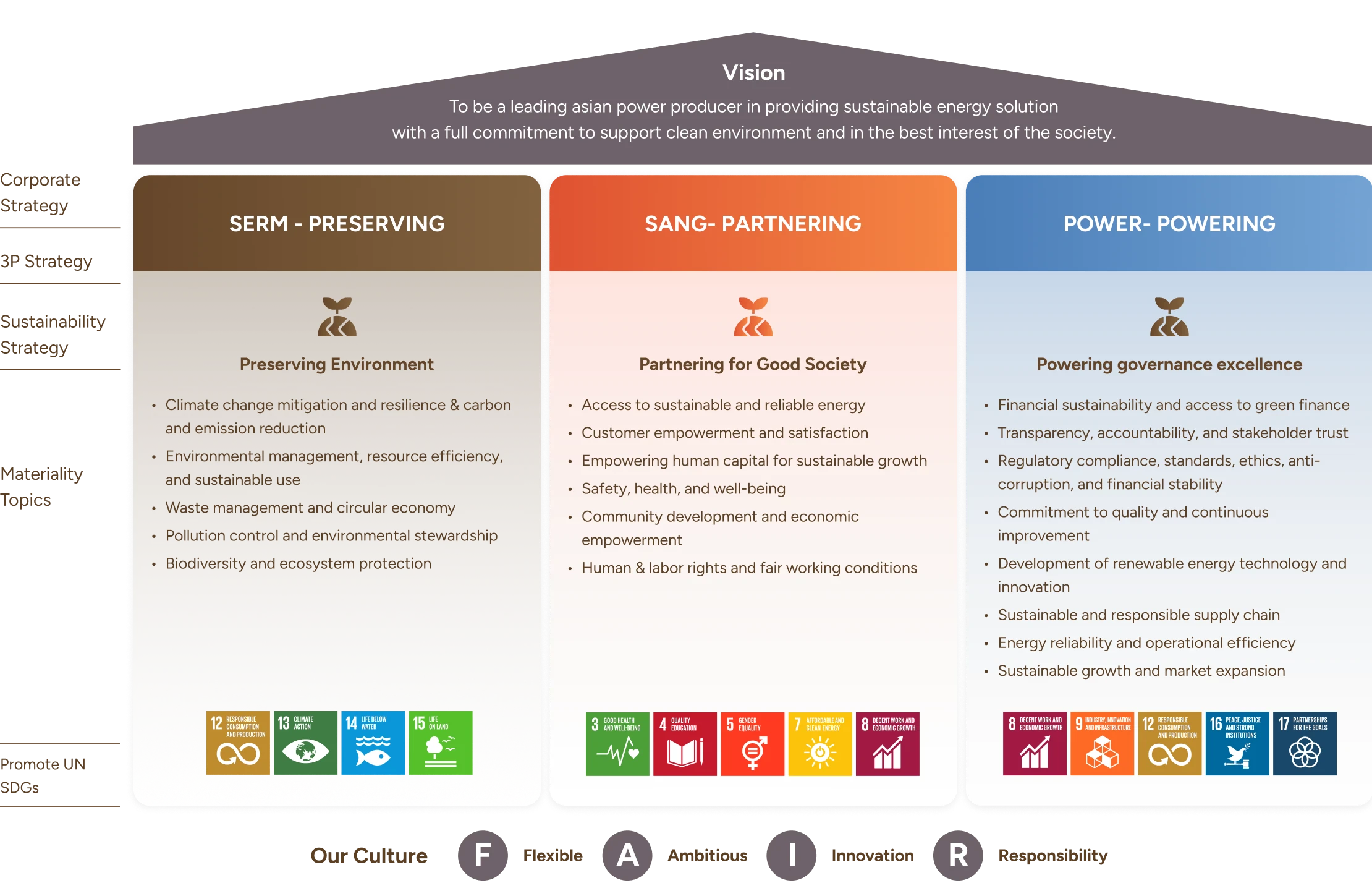- Achieve Net Zero emissions by 2050
- Reduce Scope 1 and 2 absolute GHG emissions by 20% by 2030 (base year: 2024)
- Increase clean energy generation capacity by more than 30% by 2030 (base year: 2023)
- Improve water use efficiency and reduce water consumption by at least 10% by 2030 (base year: 2024)
- Improve electricity use efficiency by at least 10% by 2030 compared to 2024 (measured in MJ/MWh)
- Achieve 80% waste recycling through the 3Rs – Reduce, Reuse, Recycle by 2030

Sustainability Framework and Goals
Sustainability Strategy and Path Forward
SERM
PreservingEnvironmental
SANG
Partneringfor Good Society
POWER
Powering Governance Excellence
The Group has established a sustainability-driven business approach aligned with its vision of becoming a leading energy company in Asia, committed to producing and supplying sustainable energy while fostering and promoting a cleaner environment for the best interest of society. This approach is built upon three core strategies aimed at creating sustainable value, supported by the “FAIR” corporate culture that reinforces a strong foundation for sustainability. It comprehensively addresses the Group’s material sustainability topics, promotes long-term business growth, and ensures the delivery of positive value to all stakeholders across the business value chain. Furthermore, the Group's initiatives contribute to advancing the United Nations Sustainable Development Goals (UN SDGs).
Sustainability Strategy and Path Forward (3P Sustainability Strategy)

SERM - PRESERVING Environmental
his strategy reflects the Group's commitment to tackling climate change, promoting resource efficiency, and protecting ecosystems. The Group emphasizes decarbonization and climate resilience through the use of renewable energy technologies such as solar, wind, and biomass, while reducing greenhouse gas emissions across all operations. The Group also supports waste management initiatives, biodiversity conservation, and protection of natural habitats while mitigating operational impacts. These efforts aim to ensure environmental sustainability and resilience for future generations.
Sustainability Goals
PRESERVING Environmental
SANG - PARTNERING for Good Society
This social strategy is aimed at creating positive social impact by promoting equity, safety, and empowerment. It emphasizes access to reliable and sustainable energy, ensuring energy equity and supporting national energy security. Customer-centricity lies at the core of operations, focusing on empowering people and increasing customer satisfaction through innovative, sustainable energy solutions tailored to individual needs. In parallel, the Group invests in human capital development, providing opportunities for learning and skill enhancement, and fostering a safe and healthy working environment to ensure sustainable organizational growth.
Sustainability Goals
PARTNERING for Good Society
- Zero complaints related to human rights violations
- Zero workplace fatalities or lost-time injuries (LTIFR) for employees and contractors
- Achieve employee satisfaction of at least 80% by 2030
- Achieve customer satisfaction of at least 90% by 2030
- Achieve community satisfaction of at least 80% by 2030
POWER - POWERING Governance Excellence
The governance strategy centers on ethical, transparent, and trustworthy business conduct, underpinned by strong governance mechanisms. It aims to position the Group as a leading force in driving sustainability in the energy sector. Aligned with this commitment, financial sustainability and access to green financing are emphasized to secure renewable energy investment. The Group also prioritizes the advancement in renewable energy technology and innovation through sustained investment in research and development, positioning itself at the forefront of the energy transition.
Sustainability Goals
POWERING Governance Excellence
- Zero complaints related to code of conduct violations
- Zero incidents of corruption or bribery
- Expand business into at least one new country by 2030
- 100% assessment of critical Tier 1 and Non-Tier 1 suppliers by 2024
